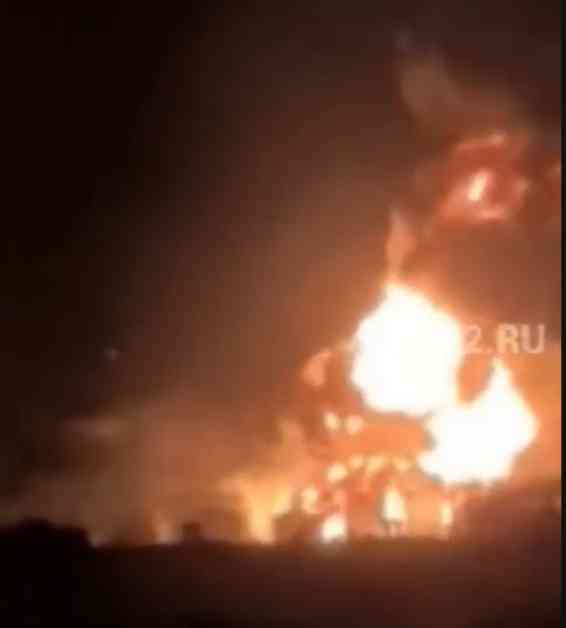Ukraine’s Drones Disrupt Russia’s Oil Refining, 10% Loss
In a bold and strategic move, Ukraine’s military has ramped up drone strikes on Russian oil refineries, dealing a significant blow to Russia’s energy sector. The most recent attack targeted the Ryazan facility, located just 100 miles south of Moscow, resulting in a massive explosion that engulfed the refinery’s primary oil processing unit in flames.
The relentless assault on Russia’s oil infrastructure is part of a concerted effort by Ukraine to undermine the country’s ability to finance its ongoing war efforts. This calculated move has sent shockwaves through the region, demonstrating Ukraine’s capability to penetrate deep into Russian territory.
Expert military analyst David Axe, writing for Forbes, emphasized the impact of these strikes, highlighting the strain on Russia’s air defenses and the strategic advantage Ukraine is gaining. The Ryazan refinery, responsible for processing 5% of Russia’s petroleum output, joins a list of key targets that have already suffered devastating blows, including the Rosneft refinery in Saratov and the Nizhny Novgorod refinery in Kstovo.
The cumulative effect of these attacks has resulted in a temporary reduction in Russia’s refining capacity by up to 10% in January, with further disruptions expected in February. As a result, Russian forces have been forced to redirect valuable resources to protect critical infrastructure, signaling a shift in priorities amidst escalating tensions.
Ukraine’s expanding drone program has been a game-changer, enabling the military to extend its operational reach and target strategic assets deep within Russian territory. President Zelenskyy’s announcement that Ukraine produced 100,000 long-range drones in 2024, with plans for increased production in 2025, underscores the country’s commitment to maintaining pressure on Russian forces.
Despite external pressures and shifting geopolitical dynamics, Ukraine’s military remains steadfast in its mission. Military officials are confident in their ability to adapt to changing circumstances and maintain a high operational tempo, keeping the pressure on Russian forces.
While Ukraine presses forward with its campaign, European leaders are reevaluating their defense strategies in light of the evolving situation. Concerns about the US’s stance on the conflict have prompted a reassessment of defense priorities and collaboration among European nations.
As Russia grapples with the economic and logistical strain caused by the sustained attacks on its refineries, experts warn of potential cascading effects on fuel supplies for both civilian and military use. With no signs of Ukraine slowing its deep-strike operations, Moscow faces mounting pressure to reassess its air defense and energy security strategies to counter the relentless assaults.
The drone attack on the main oil refinery in Ryazan Oblast represents a critical turning point in the ongoing conflict, underscoring the strategic importance of Ukraine’s precision strikes on Russian infrastructure. As the situation continues to unfold, the impact of these attacks reverberates across the region, reshaping the dynamics of the conflict and challenging Russia’s resilience in the face of relentless pressure.

















